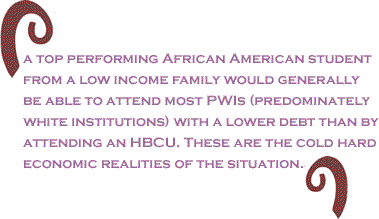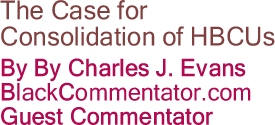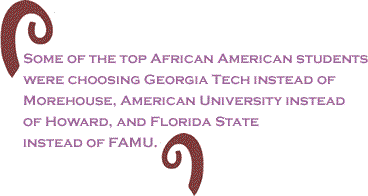
|
||||||||||||||||||||||
|
||||
 |
||||
| For
a few years now, I have been debating many of my friends who attend
or attended HBCUs on whether or not consolidation of these schools
was a realistic option in the future. Overwhelmingly, the
response was a resounding, �NO�. Brothers and sisters cited
several strong reasons, the loss of heritage, the blow to alumni,
the blending of histories that would not give either or any institution
the recognition they deserve, the fact that every HBCU serves someone
somewhere who may not get a chance at a college education somewhere
else, etc. Now to be clear, I did not attend an HBCU. I did
spend several years working for the United Negro College Fund and,
in particular, the Gates Millennium Scholars Program (GMS), which
is administered by UNCF. In my years working with GMS, which
offers the option to attend any school in the country top African
American, Native American, Alaskan Native, Asian Pacific Islander
American, and Hispanic American students, I noticed that some of
the top African American students were choosing Georgia Tech instead
of Morehouse, American University instead of Howard, and Florida
State instead of FAMU. This was not an across the board decision,
there were still young brothers and sisters that chose HBCUs instead
of PWIs (predominately white institutions, yes, this is a real term).
However, you have to remember that by receiving this scholarship,
which eliminated nearly all costs of an undergraduate degree, having
the money to attend any school in the country was no longer a concern,
meaning there was no financial comparative advantage to attending
Tulane University over Xavier University in Louisiana, when under
normal circumstances, there might be.
Clearly put, a top performing African American student from a low income family would generally be able to attend most PWIs with a lower debt than by attending an HBCU. These are the cold hard economic realities of the situation. This doesn�t have anything to do with the quality of the experience they would have in either environment, but it does speak to the amount and the duration of loan payments that could be made. Additionally, keep in mind that colleges also, essentially, make money off of students that either pay for their education out right or do so through loans. These
students and their families are critical to supplying the dollars
that are needed to acquire and retain the best educators in their
fields, build state of the art buildings with smart boards in every
classroom, fund computer labs with Mac computers or in other words
all the things that make impressionable 18 year olds choose one
school over another.
There is a catastrophic drop-out rate for African Americans that
means that many of the students that may have attended schools like
Huston Tillotson University or Miles College will not even graduate
from the high schools in their neighborhoods. This means these
students, along with the critical dollars they might have brought
in with private scholarships, loans, and family income will not
be present.
The suggestion by elected officials in Mississippi that HBCUs should consolidate may be more of harbinger of things to come than an anomaly. Many smaller HBCUs rely on state funding to maintain operations and in these times where many states are approaching bankruptcy, it�s not a foregone conclusion that the belt tightening will affect more and more of these institutions.
As controversial as the position is, I am suggesting that some HBCUs
consolidate under their own volition. Schools that realize they
are having problems recruiting students, making payments on critical
bills, developing multiple majors under disciplines etc. may consider
consolidation as a way to keep both schools active and ultimately,
help the mission of HBCUs to continue. This may also be a
way to combine endowments and offer more aid to attending students.
This would not be the first time consolidation has happened,
Clark Atlanta University is a combination of Clark College and Atlanta
University and has remained a vital institution of higher learning
since consolidating in 1988. I am well aware that consolidation
is not an easy process; schools considering this option would have
to have strong and visionary leadership as well as monumental negotiating
skills. Perhaps organizations like the United Negro College
Fund or the Thurgood Marshall Scholarship Fund could serve as arbitrators
or advisers during the discussions. |
||||
 |
||||
If you would like to comment on this article, please do so below. There is a 400 character limit. You do not need a FaceBook account. Your comment will be posted here on BC instantly. Thanks. Entering your email address is not mandatory. You may also choose to enter only your first name and your location.
|
||||
Thank you very much for your readership. |
||||
| Any BlackCommentator.com article may be re-printed so long as it is re-printed in its entirety and full credit given to the author and www.BlackCommentator.com. If the re-print is on the Internet we additionally request a link back to the original piece on our Website. | ||||
| |
||||
| November
19 , 2009 Issue 351 |
| Executive Editor: Bill Fletcher, Jr. |
| Managing Editor: Nancy Littlefield |
| Publisher: Peter Gamble |
| Est. April 5, 2002 |
| Printer Friendly Version in resizeable plain text format |
 |

|
 |
| |
| |














































